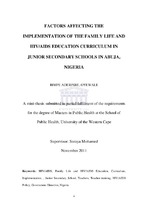| dc.description.abstract | The Family Life and HIV/AIDS Education (FLHE) curriculum was introduced into Junior Secondary Schools (JSS) in Nigeria to provide young people with life skills and knowledge essential for protecting themselves from HIV/AIDS. However, coverage of schools with the FLHE curriculum implementation is low. The purpose of this study was to determine the factors that affect the implementation of the FLHE curriculum in JSS in Abuja, Nigeria. This study was a quantitative descriptive cross-sectional survey. The study populations were teachers from public JSS implementing the FLHE curriculum in Abuja, among whom 300 teachers selected using systematic random sampling constituted the sample size. A close-ended anonymous questionnaire was administered to the research respondents as a self-administered questionnaire in English Language in their schools. A total of 300 questionnaires were administered of which 251 completed questionnaires were returned and analysed. Data analysis was undertaken using SPSS version 17 and included frequency distribution, mean score and standard deviation (univariate analysis), and cross tabulations of dependent variable (teaching of FLHE curriculum) and independent variables (awareness of HIV/AIDS policy and government directive; level of knowledge of the FLHE curriculum; level of comfort to teach FLHE curriculum; religious belief and affiliation; and cultural values of respondents). Chi-square tests and p-values were calculated to determine relationship between variables. Throughout this study, the autonomy of the respondents and dignity were respected; and their participation was voluntary. There was full disclosure of the purpose of the study. The respondents were assured of the confidentiality and anonymity of the information collected; and their written consent were secured prior to participation in the study. The majority (72%) of teachers in this study were aware of the National HIV/AIDS Policy and the government directive to mainstream topics in the FLHE curriculum into existing subjects (78%). Just above one-third (36%) of the teachers had ever seen a copy of the HIV/AIDS policy and knew all the content of the policy. The study revealed that only 5% of the teachers in schools implementing the FLHE curriculum had sufficient level of knowledge of the FLHE curriculum. Majority of the teachers (71%) knew the content of only one (HIV infection) out of the five themes in the curriculum, and 4 out of 5 of the teachers were comfortable in teaching the curriculum to students. The lack of sufficient level of knowledge of the FLHE curriculum and the content of the HIV/AIDS policy and government directive among majority of the teachers were major factors that affected the implementation of the curriculum. Awareness of the government directive (P= 0.000) as opposed to the HIV/AIDS policy (P= 0.772) among the teachers was found to be an important factor to harmonize implementation modalities of the curriculum. The study also noted that personal perception (P = 0.000), cultural values (P = 0.000) and religious belief (P = 0.000) of the teachers as opposed to their religious affiliation (P= 0.218) were important factors in the teaching of FLHE curriculum to students. This study has established that several factors among teachers that included awareness of the government directive to mainstream topics in the FLHE curriculum into subjects, knowledge of the content of the FLHE curriculum and personal perception to the teaching of the curriculum, as well as religious belief and cultural values affected the implementation of FLHE curriculum in JSS in Abuja, Nigeria. | en_US |

